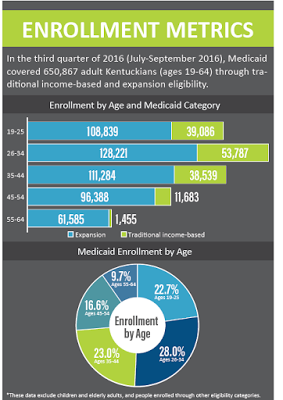Most adults on Medicaid qualify because Ky. expanded program; at risk as Republicans in Congress work to replace Obamacare

 By Melissa Patrick
By Melissa PatrickKentucky Health News
More than three-fourths of Kentucky adults on Medicaid were eligible only because Kentucky expanded its Medicaid program in 2014, according to a study done for the Foundation for a Healthy Kentucky.
Then-Gov. Steve Beshear expanded Medicaid under federal health reform to include those who earn up to 138 percent of the federal poverty level, $16,394 for an individual or $33,534 for a family of four. Before expansion, the state’s income limit for those who weren’t disabled or pregnant was 69 percent or less of the poverty line.
The study found that in the third quarter of last year, 650,867 Kentucky adults were covered by Medicaid, 78 percent (506,317) were covered by the expansion, and 69 percent were under the age of 44. In all, Kentucky has about 1.3 million people on Medicaid and about half of them are children.
Foundation President and CEO Ben Chandler pointed out that many of these Kentuckians have incomes just above the poverty level, but still too low to otherwise afford health insurance.
“The latest available numbers continue to show that expansion of Medicaid in Kentucky has greatly increased the number of low-income people who have health insurance,” Chandler said in the news release. “Improving the health of Kentucky means making sure no Kentuckians have to rely on the emergency room for health care.”
 The report also found that every region of the state has large numbers of Medicaid enrollees, but only in Eastern Kentucky does a region’s share of the state’s Medicaid enrollees (31 percent) exceed the region’s share of the state’s population (21.6 percent).
The report also found that every region of the state has large numbers of Medicaid enrollees, but only in Eastern Kentucky does a region’s share of the state’s Medicaid enrollees (31 percent) exceed the region’s share of the state’s population (21.6 percent).
Gov. Matt Bevin has said that Kentucky can’t afford to have a third of its population on Medicaid and has asked the federal government to approve changes that would encourage enrollees to be more involved in their health care through things like income-based premiums, health savings accounts and work and volunteer or work requirements for those who aren’t primary caregivers. Meanwhile, Republicans in Congress are working to repeal and replace the law that allows the expansion.
The study was done by the State Health Assistance and Data Center at the University of Minnesota.